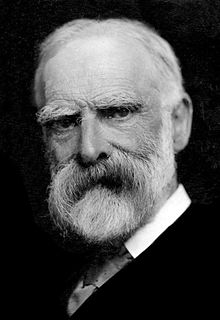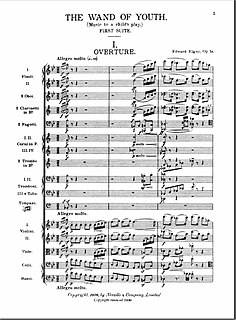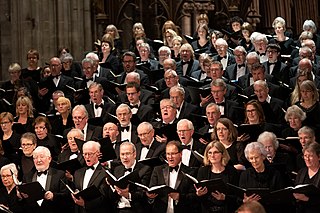Related Research Articles

"And did those feet in ancient time" is a poem by William Blake from the preface to his epic Milton: A Poem in Two Books, one of a collection of writings known as the Prophetic Books. The date of 1804 on the title page is probably when the plates were begun, but the poem was printed c. 1808. Today it is best known as the hymn "Jerusalem", with music written by Sir Hubert Parry in 1916. The famous orchestration was written by Sir Edward Elgar. It is not to be confused with another poem, much longer and larger in scope and also by Blake, called Jerusalem The Emanation of the Giant Albion.

Sir Edward William Elgar, 1st Baronet, was an English composer, many of whose works have entered the British and international classical concert repertoire. Among his best-known compositions are orchestral works including the Enigma Variations, the Pomp and Circumstance Marches, concertos for violin and cello, and two symphonies. He also composed choral works, including The Dream of Gerontius, chamber music and songs. He was appointed Master of the King's Musick in 1924.

Sir Charles Hubert Hastings Parry, 1st Baronet was an English composer, teacher and historian of music. Born in Richmond Hill in Bournemouth, Parry's first major works appeared in 1880. As a composer he is best known for the choral song "Jerusalem", his 1902 setting for the coronation anthem "I was glad", the choral and orchestral ode Blest Pair of Sirens, and the hymn tune "Repton", which sets the words "Dear Lord and Father of Mankind". His orchestral works include five symphonies and a set of Symphonic Variations. He also composed the music for Ode to Newfoundland, the Newfoundland and Labrador provincial anthem.

James Bryce, 1st Viscount Bryce, was a British academic, jurist, historian, and Liberal politician. According to Keoth Robbins, he was a widely-traveled authority on law, government, and history whose expertise led to high political offices culminating with his successful role as ambassador to the United States, 1907–13. His intellectual influence was greatest in The American Commonwealth (1888), an in-depth study of American politics that shaped the understanding of America in Britain and in the United States as well.

James Edward Hubert Gascoyne-Cecil, 4th Marquess of Salisbury,, known as Viscount Cranborne from 1868 to 1903, was a British statesman.

The Wand of Youth Suites No. 1 and No. 2 are works for full orchestra by the English composer Edward Elgar. The titles given them by Elgar were, in full: The Wand of Youth First Suite, Op. 1a (1869–1907) and The Wand of Youth Second Suite,.
Events from the year 1848 in the United Kingdom.
The Coronation Honours 1911 for the British Empire were announced on 19 June 1911, to celebrate the coronation of George V which was held on 22 June 1911.
This is a summary of 1954 in music of all genres in the United Kingdom.
The 1902 Coronation Honours were announced on 26 June 1902, the date originally set for the coronation of King Edward VII. The coronation was postponed because the King had been taken ill two days before, but he ordered that the honours list should be published on that day anyway.
The New Year Honours 1925 were appointments by King George V to various orders and honours to reward and highlight good works by members of the British Empire. They were published on 30 December 1924.
The New Year Honours 1922 were appointments by King George V to various orders and honours to reward and highlight good works by members of the British Empire. They were published on 30 December 1921.
The 1928 New Year Honours were appointments by King George V to various orders and honours to reward and highlight good works by citizens of the United Kingdom and British Empire. They were announced on 30 December 1927.

Apollo University Lodge No 357 is a Masonic Lodge based at the University of Oxford aimed at past and present members of the university. It was consecrated in 1819, and its members have met continuously since then.
The 1869 Birthday Honours were appointments by Queen Victoria to various orders and honours to reward and highlight good works by citizens of the British Empire. The appointments were made to celebrate the official birthday of the Queen, and were published in The London Gazette on 2 June 4 June and 1 July 1869.
This is a summary of 1902 in music in the United Kingdom.

Worcester Festival Choral Society (WFCS) is an independent, SATB choir of around 150 amateur singers that presents classical choral concerts at Worcester Cathedral, Worcester. The conductor is Samuel Hudson and the accompanist is Nicholas Freestone. The Chairman is Ben Cooper. The President is The Lord Bishop of Worcester and Senior Vice President is The Dean of Worcester.
References
- ↑ Geoffrey, Watson. "Notes and Queries". The Guardian. Retrieved 24 April 2016.
- ↑ "THE FIGHT FOR RIGHT MOVEMENT". The Spectator Archive. The Spectator. Retrieved 24 April 2016.
- ↑ "THE FIGHT FOR RIGHT MOVEMENT". The Spectator Archive. The Spectator. Retrieved 24 April 2016.
- ↑ "World War One: the Cultural Front - 3-3 Dada and Defiance". iPlayer. BBC Radio 4. Retrieved 24 April 2016.